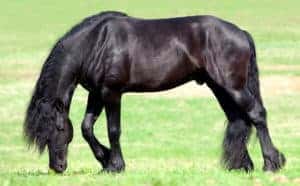
The Clinical Signs of Equine Colic
Learn to identify these common and important signs of colic in horses–doing so might save your horse’s life.

Learn to identify these common and important signs of colic in horses–doing so might save your horse’s life.

A general physical examination is performed as part of the clinical evaluation of the horse exhibiting colic.

Owners can help their vets diagnose colic by offering the afflicted horse’s complete health history.

Certain management factors might affect the likelihood of colic episodes.

One study showed that equine colic has an estimated prevalence of 4.2 events per 100 horses per year.

Understanding the horse’s digestion process can help you better manage factors that could cause colic.

The equine intestinal tract can be divided into large sections based on its overall function.
Can antiviral drugs be used to successfully treat horses with equine herpesvirus? Recent research into the drug Valacyclovir (trade name Valtrex) seems to indicate it has a place in treating horses exposed to–and diagnosed with–equine herpesvirus
About a year and a half ago, my horse was diagnosed with EPM, which he was treated for. Now he’s having hock issues.
Clinical signs of colic are those changes in behavior or activity that indicate abdominal pain.
The term colic actually means, in the broadest sense, abdominal pain. Abdominal pain is relatively common, even in people. We tend to refer to our abdominal pain as “stomach aches.”
Editor’s Note: This is an excerpt from Understanding Equine Preventive Medicine by Bradford G. Bentz, VMD. This book is available from
Feeding young, growing horses means providing more digestible energy and paying close attention to nutrients.
Learn how to record keeping aids in preventive medicine for horses.
Horses with chronic musculoskeletal disorders may benefit from periodic administration of analgesic medications such as NSAIDs to help control pain when it is at its worst.
A balanced vitamin supplement may best provide the additional needed vitamins. However, once again, it is important not to overestimate the intensity of exercise and competition your horse performs so that you do not oversupplement with potentially h
Stay on top of the most recent Horse Health news with
© 2022 Copyright Statement dolor sit amet, consetetur sadipscing User Terms, sed diam nonumy eirmod tempor invidunt ut labore et dolore magna aliquyam erat, sed diam voluptua. At vero eos et accusam et justo duo dolores et ea rebum. Stet clita kasd gubergren, no sea takimata sanctus est Lorem ipsum dolor sit amet.